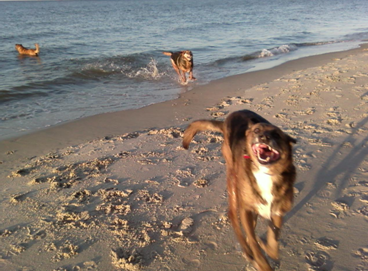This article was written by Karen Porreca, PETA’s senior library director and chief copy editor.
Answer: Yes, absolutely! But canine drama queens are known as “reactive” dogs. As with human drama queens, reactive dogs respond in an overly emotional manner to life events―even rather mundane ones.
I’m familiar with canine drama queens because I live with one named Dexter. When I adopted Dexter seven years ago, if I walked him outside on a leash and he heard another dog barking anywhere in the neighborhood, he would start jumping up and biting at his leash. If another dog walked by on a leash, Dexter would start lunging toward the dog and try to drag me across the street. If we were indoors and he heard any sound outside, even just a neighbor coughing, he would start barking his head off and racing around the house.

Dexter, my drama queen
Human drama queens can lose the drama by learning to change the way they think (I know―I used to be one), but unfortunately, we can’t coach our dogs to change the way they think, so we have to help them calm down in other ways.
The top priority in dealing with a canine drama queen is to provide a tranquil environment and a calm presence. One thing common to all drama queens is that they want you to buy into their drama. So if you start yelling or panicking or getting all worked up when your dog is overreacting, then you will just be fanning the flames. Stay calm, no matter what. Remember, it’s all in the way that you think. Nervous tension is quite contagious to our canine friends, so try to set a good example.
Second, don’t reinforce reactive behavior. Never reward a dog for overreacting in any way. Many people do this inadvertently by petting Fido in order to soothe him. But the message received by Fido is “Good dog! I like it when you overreact.” Instead, make a conscious effort to reward Fido for being calm. If you see him being nice and relaxed, praise him and even give him a treat―don’t take it for granted. Dogs, like all of us, tend to repeat behavior that brings rewards.
Third, try to desensitize your dog to the things that trigger the overreactions. One thing that eventually helped me desensitize Dexter to the sound of barking dogs was to position him near a yard containing a barking dog (not too close at first―we gradually got closer and closer) and to throw treats on the ground for him to eat. As he ate the treats and continued to hear the barking, he began to feel less agitated by the barking dogs and to form a more neutral if not positive association with them. A humane dog trainer can suggest many other techniques.
Fourth, try to include the maximum amount of exercise in your dog’s daily routine (long walks are the best). A tired dog can’t muster the energy for drama, and sleeping dogs are only drama queens in their dreams.
Finally, there is a wide range of products that can help canine drama queens to settle down. These can be used during particularly stressful events, such as trips to the vet, or they can be used every day:
- Some of the most helpful, in my opinion, are the CDs from Through a Dog’s Ear. These CDs contain classical music that has been adapted (simplified and set to a slower tempo) specifically to relax dogs, and they’ve been extensively tested on shelter dogs. They can be played at home or in the car.
- Natural, calming nutritionalsupplements, such as Pet Calm (one of the old standbys) and many others, can also help. I’ve found that plain St. John’s wort takes the edge off Dexter’s hyper-reactivity. But I suggest trying out a few different supplements during calm times so that you’ll know which one is going to be the most effective when a particularly stressful event occurs.
- There are also canine pheromones that can be delivered via a wall-outlet diffuser, sprayed in the vicinity of your dog, or even worn on your dog’s collar. The active ingredient is a dog-appeasing pheromone, or DAP―a synthetic version of the pheromone produced by a lactating mother dog―that is very comforting even to adult dogs.
Canine drama queens are notoriously difficult to reform, but it helps to take the long view. The seven years that I’ve had Dexter have flown by, and although he will always be a bit of a drama queen, his bouts of drama are far less frequent, significantly shorter, and so much more manageable now.
Text VEG to 73822 to get the latest vegan lifestyle tips, recipes, and urgent action alerts texted right to your phone.
Terms for automated texts/calls from PETA: https://peta.vg/txt. Text STOP to end, HELP for more info. Msg/data rates may apply. U.S. only.







